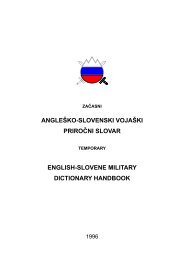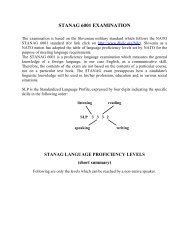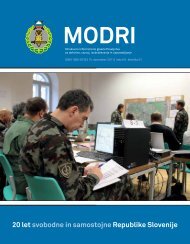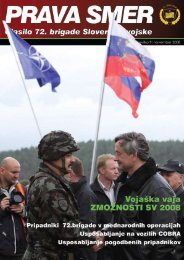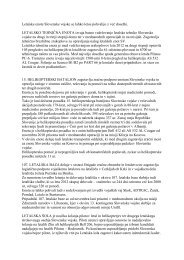Letnik 9/2, september 2007 - Slovenska vojska
Letnik 9/2, september 2007 - Slovenska vojska
Letnik 9/2, september 2007 - Slovenska vojska
You also want an ePaper? Increase the reach of your titles
YUMPU automatically turns print PDFs into web optimized ePapers that Google loves.
John J. Le Beau<br />
terrorist plot against passenger aircraft precisely because of timely, actionable<br />
intelligence, properly shared and acted upon before the terrorists could carry out<br />
their plans” (Priest, 2005). The record clearly indicates the utility of intelligence<br />
information, and the operations based upon careful analysis of this information, as<br />
applied against the jihadist-terrorist target. To be sure, an authoritative accounting<br />
of the efficacy of counter-terrorist intelligence operations will have to await the<br />
declassification of substantial documentary evidence, a process not likely to occur<br />
for decades, if then, given the inherent sensitivity of the information on “sources<br />
and methods”. Still, some points can be noted or surmised with considerable<br />
certainty.<br />
First, counter-terrorism operations recently engaged in by the CIA and other<br />
intelligence bodies demonstrate the value of robust intelligence sharing between<br />
and among competent intelligence services. This, perhaps, should by no means<br />
appear counter-intuitive, but in truth the worth of so-called “liaison relationships”<br />
has been much derided within the intelligence community for decades before<br />
9/11. The inclination to favor unilateral over cooperative operations has long been<br />
a powerful school of thought at CIA and elsewhere. There are some compelling<br />
reasons for this. Against traditional intelligence targets at least (such as another<br />
nation-state), unilateral activities have logically been regarded as the more secure,<br />
and surely more traditional, method of operation. In determining to approach or<br />
suborn, say, a Third Secretary from the Soviet embassy in Rome during the height<br />
of the cold war, insisting on a purely American operation, vice one that involved<br />
the Italian service, might have made sense. With two services involved, the chances<br />
of a leak or, much worse, betrayal by a hostile penetration, increase fifty per cent.<br />
The risk of compromise might even be assessed as greater, in the event that the<br />
other service in question is regarded as having a poor counter-intelligence and<br />
security capacity. On the other side of the coin, the value of running a traditional<br />
espionage operation bilaterally would depend ultimately on what the other<br />
perspective partner could bring to the table, the “value added”. If the objective<br />
answer is “not much”, the reason to contemplate a particular bilateral operation<br />
vanishes. As well, deciding to propose a bilateral operation to another service<br />
inherently means revealing to that service the object of attention (in our fictive<br />
case, the Soviet Third Secretary). In the event, the liaison service being approached<br />
(here the Italians) can always decline the offer for any number of reasons, none<br />
of which they are bound to state. Accordingly, in our example at least, unilateral<br />
action promises to be more effective from the U.S. vantage point.<br />
85




